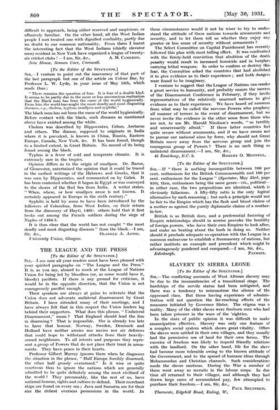SLAVERY IN SIERRA LEONE [To the Editor of the SPECTATOR.]
SIR,—The conflicting accounts of West African slavery may be due to the inconsistencies of a transitional stage. The hardships of the servile status had been mitigated, and there was a tendency to misconstrue the silence of the oppressed class. But those having experience of adminis- tration will not question the far-reaching effects of the measures initiated by Governor Slater. The stigma was a reality. Many of the older slaves were freeborn men who had been taken prisoner in the wars of the 'eighties.
In the state of public opinion it was difficult to make emancipation effective. Slavery was only one feature of a complex social system which shows great vitality. Often the slaves were settled in their own villages, and they usually had the permissive use of land for their own farms. The exercise of freedom was likely to imperil friendly relations with the landlord. On the other hand, life for the slave had become more tolerable owing to the known attitude of the Government, and to the spread of humane ideas through Mohammedan and Christian channels. ' Such considerations made the slaves cautious. During the War a number of them went away as recruits in the labour corps. In due time all returned to their villages, and although they had drawn large sums of accumulated pay, few attempted to purchase their freedom.—I am, Sir, &c.,
PAUL SRUFFREY.
Thorneote, Edgehill Road, Ealing, W.






































 Previous page
Previous page